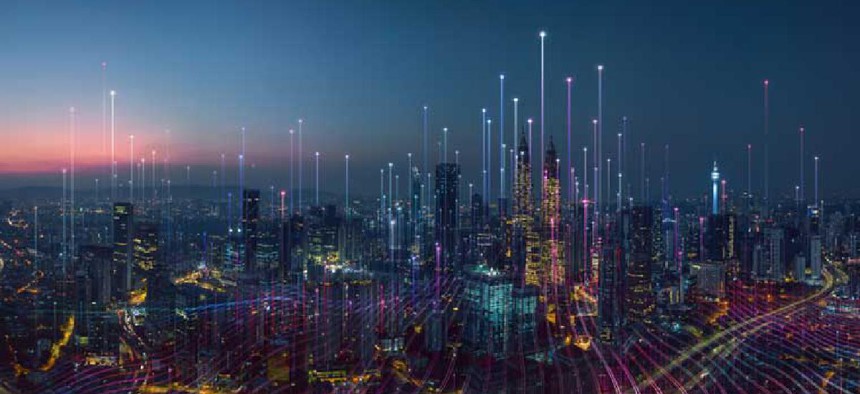6 tech trends defining future cities

Sustainable neighborhoods, a supercharged infrastructure and inclusive innovation that strikes back at surveillance capitalism will shape the future of urban technology, a new report says.
Sustainable neighborhoods, a supercharged infrastructure and inclusive innovation that strikes back at surveillance capitalism – these will be the mainstays that shape the future of urban technology, according to a report from the Jacobs Institute’s Urban Tech Hub at Cornell Tech.
For the report, the research team conducted a 10-year horizon scan, scouring thousands of published journals, news articles and blogs to identify the most relevant and important trends. The raw data was synthesized to reveal 217 unique perspectives and 49 trends that describe the direction of urban tech in the next decade.
Anthony Townsend, the project lead, says the report could serve as a blueprint for the future.
“The Horizon Scan is meant to create a conversation across the many areas that are a part of urban tech,” Townsend said. “The report describes the innovations that the field could produce in the coming decade. But it also lays out the ‘technical debt’ that’s already on the books due to hasty decisions about sensing, AI, and tech governance.”
Though the report covers a number of technological advances, from mobility solutions to the complexities of privacy related to facial recognition, the research team homes in on six key themes that will likely have the biggest impact on the future of cities.
First, smart city concepts have seen steady progress over the last decade, with more municipalities equipping their buildings with digital sensing. Improved real-time tracking of energy, waste and water have led to increased control and savings. However, this infrastructure is not linked up at city scale, and the broader efficiencies of “greater interconnection” remain yet to be seen.
Along a similar vein, the report cites scaling sustainable building technology as another theme, as cities look to cut carbon emissions in efforts to contain the effects of climate change. Cities are expected to rebuild districts by launching their own “climate moonshots” over the next decade, the report said. Technology will play a critical role as political and financial capital is focused on megacities, where street-level solutions will be key in extracting the maximum value.
City infrastructure is also expected to play an important role in shaping the future of urban technology. The COVID-19 pandemic highlighted how understanding urban ecosystem can help anticipate outbreaks, as scientists used sewage sampling and microbiome sequencing in city transit systems to track spread of the virus. Many cities are even wiring up waterways and parks to calculate the vitality of these ecosystems.
Artificial neural networks, which power some of cities’ most sophisticated machine learning efforts, can provide incredible value to governments by predicting the movements of goods, people, resources and information. At the same time, by deploying such powerful tools society risks giving up individual freedoms, the report states.
Look for cities to increase their focus on hitting equity goals, the report says, as the shift toward remote “everything” -- from learning and health care to work and entertainment -- reveals wealth and power disparities. Fostering technologies that empower the disempowered can help ensure an efficient, tech-powered future, the report suggests.
Finally, the researchers predict that in the decade ahead, “big tech will crack the code of the city and stitch together a planetary supply chain for urban innovation.” Governments are getting a clearer picture of the problems they want industry to solve, and the challenges of realizing smart city innovation is becoming clearer. The new urban innovation industry will bring big financial and political players into the mix, meaning much of the decision-making “will play out within the high-stakes context of Sino-American geopolitical jockeying,” the report states.
“This research project is a testament to our belief that the future of technology is the future of cities,” Urban Tech Hub Founding Director Michael Samuelian said. “By focusing our gaze on the future, we can make better-informed decisions on the increasing challenges that today’s cities face every day.”
The full report can be found here.
NEXT STORY: Can Minecraft promote worldwide biotech?





